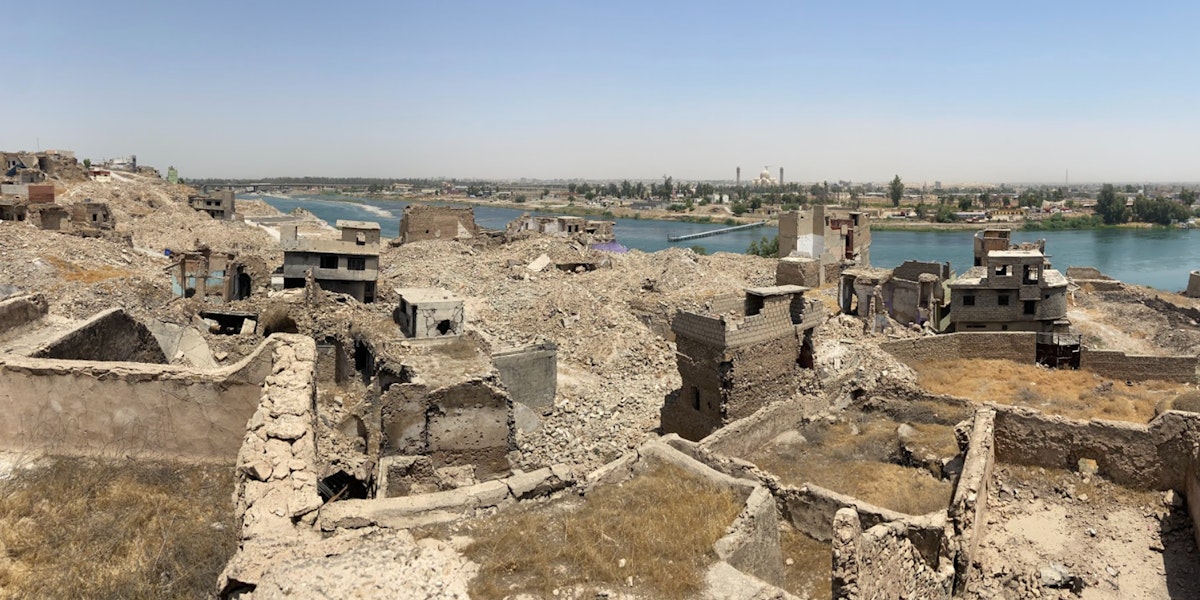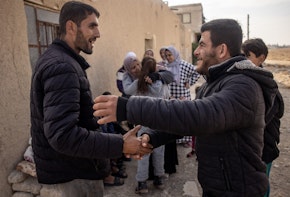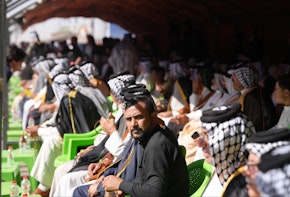Late one night this summer in a park on the edge of Mosul’s Old City, I met a group of teenagers unwinding by a fountain at the end of a blistering day.
They were day laborers from the hardscrabble district of Zanjili, known for its factories and auto repair shops. The Islamic State (most locals refer to the group by its early acronym—“Da’esh” in Arabic, or ISIS in English) had recruited with great success from their neighborhood, but so had the Iraqi security services. By some estimates, more civilians than ISIS fighters were killed when the Iraqi military finally liberated Zanjili in 2017.1
“The guys our age who joined ISIS, they had power, security, cars,” said one of the survivors, twenty-year-old Bassam.2 Many unemployed youths from the neighborhood, Bassam said, formed gangs that worked for anyone who paid, including organized crime syndicates and terrorist groups. But his group of friends, Bassam said, had a “good mentality” and preferred to stay away from crime and terrorism.
Virtue had not brought Bassam and his friends much reward. All of the men in the group at the park had lost family members to ISIS rule or the 2017 liberation of Mosul. Now they faced stifling poverty, state corruption, and occasional harassment from the Iraqi security forces supposedly protecting them from a return of ISIS.
Most of the locals who joined ISIS—like four of Bassam’s brothers—were killed defending the self-declared caliphate. Those who lived aren’t far from Mosul. Some still fight for ISIS in the desert and farmland beyond the cities. I met others living in camps for the displaced, afraid that if they returned to Mosul they would be thrown in jail or killed in revenge.
Mosul’s predicament points to the difficulty of fully eradicating groups like ISIS and al-Qaeda, which have done well in areas that are poorly governed or subject to capricious violence from the state as well as from jihadists.
A better life for people in Mosul would be a good outcome in its own right. It would also limit the future prospects of ISIS and its imitators. The international spotlight moved away from Mosul shortly after the Islamic State’s caliphate fell in 2017. The focus of the U.S. government also moved away. The United States had mobilized impressively to engineer a military coalition against ISIS, but had little bandwidth to stay involved in the aftermath of the fight.
Stability, however, requires policy attention to terrorist hotspots after battles are over. Mosul today needs human security and justice for both the perpetrators and victims of ISIS. Better governance in Mosul is a win-win proposition—an undeniably wise investment in human well-being that just might also foster stability in a troubled, strategic corner of the world.
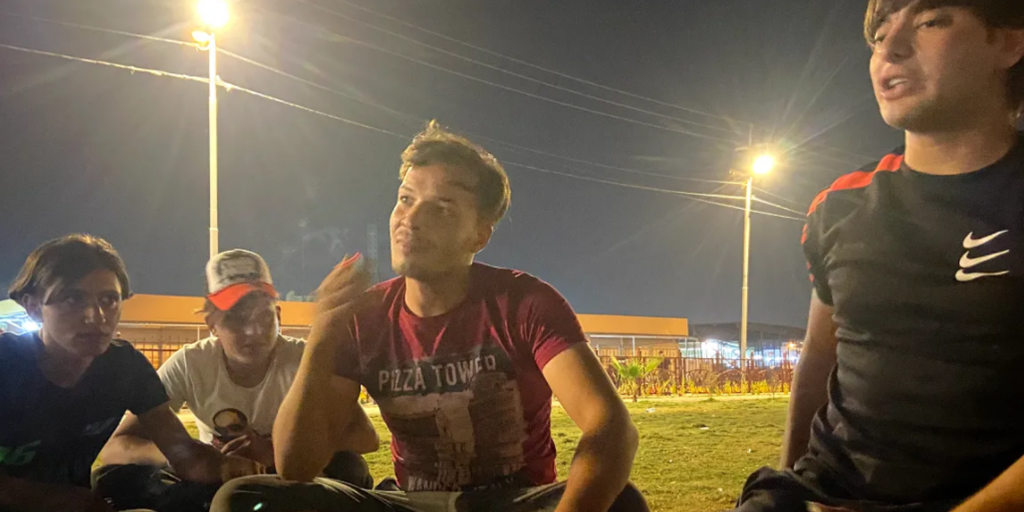
American debates about counterterrorism have tended to focus on a false choice between unending military campaigns and complete disengagement. Critics and supporters of the U.S. pullout from Afghanistan, for example, argued as if the only two options were an endless war that fueled epic corruption or a full withdrawal of all international support.3 Hand-wringing on the twentieth anniversary of the 9/11 attacks featured the same misleading discourse.
However, to reduce the risk of future violence, the United States needs to pay attention and dedicate resources after the fighting—with civilian governance campaigns that follow military counterterrorist operations. Washington needs political and economic policies that balance, and in most cases replace, its military campaigns abroad. In Iraq, as in Afghanistan, the national government is sovereign and takes the leading role; but in both cases, American military intervention created many of the crises that civilian policymakers are now supposed to address. If Americans take the lead in the “kinetic” stage of counterterrorism operations, they ought to take responsibility in the aftermath for reconstruction and better governance. Iraqi officials can and should exercise sovereignty in their own country, but they should not be expected to undertake expensive infrastructure projects and initial investments in governance that American-led military operations necessitate.
A credible counterterrorism policy must revolve around good governance, rights, and human dignity. Military action against jihadist groups is only a precursor to better rule, not its foundation.
Four years after the military victory over ISIS in Mosul, U.S. policy and resources are barely in evidence. The Iraqi government might be doing the best it can be expected to, but that’s not enough to transform Mosul into a humanely governed place to live—the bare minimum owed to a population that lived under the Islamic State. Better governance is also probably the surest way to forestall a resurgence of ISIS: jihadist groups continue to find new footing in parts of Iraq that experience nothing but military occupation or grinding marginalization. A credible counterterrorism policy must revolve around good governance, rights, and human dignity. Military action against jihadist groups is only a precursor to better rule, not its foundation. To prevent a future incarnation of the caliphate, the United States and its partners need to invest as vigorously in the peace as in the counterterrorist war.
This report draws on repeated visits to Iraq between 2018 and 2021, and more than two dozen interviews conducted in person in Mosul and other parts of Iraq in July 2021, including with Iraqi government officials.
Counterterrorism, but at What Cost?
Mosul offers a stark lesson in the difficulty of effectively countering terrorism. Iraqis made inordinate sacrifices to end ISIS rule. Yet long after the caliphate’s end, ideological support for ISIS persists, and the Iraqi government appears to be repeating past mistakes. Baghdad is meting out collective punishment against Sunnis in a manner that fuels a sense of grievance and communal marginalization. At the same time, the government oversight of its fragmented security forces has become careless and corrupt, just as it was before 2014. As a result, the state is poorly equipped to monitor and deter ISIS and other insurgents.4
Iraq must find a lasting formula for better governance. Otherwise, ISIS or a successor group may yet find willing volunteers and receptive constituents. If sound governance eludes Iraq and its many international partners, it will be a tragic lost opportunity—not only because so many Iraqis gave their lives to defeat ISIS, but also because the fight against the extremists was a rare moment of collaboration among adversaries.
The world can also learn from Iraq’s experience. The fight against ISIS was, by some measures, a counterterrorism success story. But it was also exceptionally bloody and costly, and its outcome remains precarious. There is now enough data to ask whether there is a better way to neutralize death cults like ISIS—in Iraq and elsewhere—since the world is likely to see further attempts by successors or imitators.
As ISIS advanced in Syria and Iraq in 2013–14, its sadistic excesses shocked the world. A normally fractious group of rivals came together to defeat the caliphate. The United States and its allies supplied the anti-ISIS coalition with the world’s most advanced drones and bombers.5 Iraqis from every region, sect, and ethnic background volunteered for combat assignments that came with a high chance of death or serious injury.
Iran and the United States, so often on opposite sides of proxy wars in the Middle East, supported a methodical military campaign in which committed Iraqi infantry bore the brunt of the casualties. Iraqi military, police, and Kurdish peshmerga fought alongside legacy militias as well as new, hastily assembled irregulars.
The campaign against ISIS drew on the lessons of previous, more destructive military campaigns against jihadist groups and insurgencies. Local troops led the fight. At times, they took great risks to protect civilians, and at others, they tolerated high civilian casualties.6 (ISIS was ruthless until the end, and in the final days of the battle of Mosul, its snipers killed civilians who tried to flee the city.) The Iraqi government framed the war against ISIS in nationalist rather than sectarian terms. The United States prioritized local leadership of its counterterrorist campaigns, in a doctrine that became known as “by, with, and through.” As Jim Mattis, the U.S. secretary of defense at the time, put it: “Our approach is by, with, and through our allies, so that they own these spaces and the U.S. does not.”7
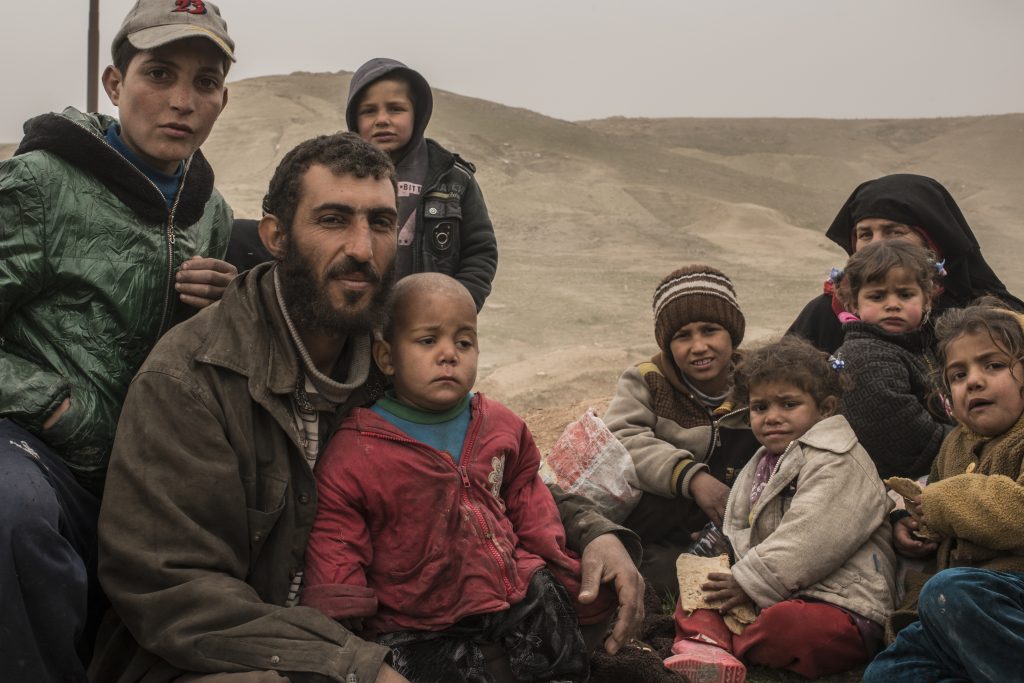
Local leadership had costs as well as benefits. For example, it may have contributed to the high level of civilian casualties in Mosul, because of Iraqi political decisions to heavily bomb residential areas and to block escape routes for ISIS fighters from the Old City. On the other hand, it was good that the United States recognized its own limitations and acknowledged the centrality of local partners and the national government. Iraqi agency can and should stand at the center of what happens in Iraq.
But the United States cannot wash its hands of the consequences of the war, or wish away its stake in the ultimate outcome, simply because Iraqis took the lead on the ground during the fighting. U.S. military doctrine asserts that locals, and not the United States, “own” the battle space, but after the fight the United States still “owns” its interests and is responsible for its actions. What it bombs, it ought to rebuild. Regardless of who collaborated in combat decisions, the United States cannot outsource to local partners the responsibilities that come with the deployment of mighty American air power.
After the fight, the United States still “owns” its interests and is responsible for its actions. What it bombs, it ought to rebuild.
The destruction and suffering left in the wake of the counter-ISIS conflict are staggering, and reconstruction is daunting. At least 10,000 civilians were killed in Mosul, according to estimates gathered by local officials, journalists, and researchers.8 At least 1,200 Iraqi government forces were killed and 6,000 wounded.9 Millions of people were displaced from Mosul and surrounding towns—first when ISIS took over the area in 2014, with another mass exodus culminating in June 2017 during the final year of the military campaign to dislodge ISIS.
Mosul’s example shows that there are two obvious areas where counterterrorism policy can dramatically improve. The first is prioritizing the lives of the civilians it is supposed to protect. Counterterrorism operations can take better care to avoid civilian deaths from indiscriminate shelling and from airstrikes. Perhaps more consequential is the need to increase attention to the aftermath of combat. The military phase of a counterterrorism campaign must be followed by energetic reconstruction and a long-term commitment to better governance, to reduce the risks of future recurrence.
Lingering Support for ISIS
It’s possible to find unrepentant ISIS supporters with a little effort. An hour’s drive northeast of Mosul, in the Kurdish-controlled Hassan Sham Camp, I met a few who were willing to talk openly about their continuing sympathy for the caliphate.
One, a man named Mohammed (he told me his last name, but I am withholding it here to protect him from reprisals), told me that he joined ISIS over his family’s objection. He was fourteen years old in the summer of 2014; ISIS had taken over Mosul and declared the caliphate. Mohammed liked what he saw and heard.
“I believed in them very deeply,” Mohammed told me, a wistful smile on his face. Mohammed’s father was in the Iraqi army, he said, and was enraged when his son joined ISIS. For two years, Mohammed fought on the front lines, he said, rattling off a list of battles in which he participated: Bazwaia, Tal Kayf, Bartella, Mosul Dam, and many others.
Mohammed said he quit as a fighter before ISIS was defeated—not because he changed his mind but because his parents pressured him to return home to his village. Reluctantly, he said, he told his commanders he needed to leave. He was detained for a week, and finally allowed to go after receiving his punishment: ten strikes with a metal pipe on the shoulder.
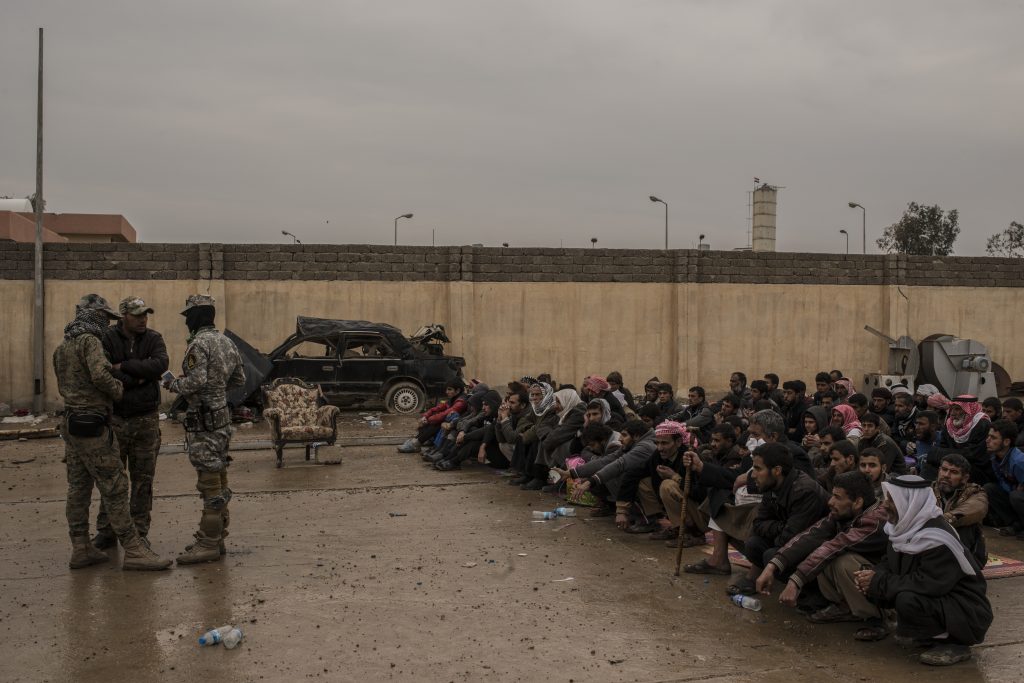
After ISIS fell, Mohammed said he turned himself in to Kurdish forces, in whose custody he believed he’d be safer than at the hands of his own community. He said he spent a year or so in prison in Erbil, where he was interrogated by Kurdish intelligence and Americans. Eventually he was allowed to go free, but he feared for his safety outside of the Kurdish enclave. So, Mohammed came to Hassan Sham camp, which is controlled by the Kurdistan Regional Government but lies between the last Kurdish checkpoint and the first Iraqi government one. Most of the camp residents describe themselves as victims of ISIS.
Mohammed’s parents visit him in the Hassan Sham camp, where he shares an unbearably hot tent with other men his age. They occupy an area reserved for single men. Most of the men there have been cleared by the Kurds to return home, but they’re afraid to approach even the first Iraqi checkpoint a few miles from the camp; they know they’ll have to face another vetting by Iraqis, which they might not survive.
“I wish I had gotten killed,” Mohammed said. “It would be better than this life.”
Isolated from society in the camp, Mohammed and the other former ISIS fighters and supporters focus on their own grievances and fears. They live in limbo, with no reliable path to redemption or accountability. There is no clear or safe process, for instance, through which they could surrender to Iraqi authorities and serve prison time or be allowed to return home. Many communities won’t accept ISIS supporters and members anyway, even with official permission.
I met a woman in the Hassan Sham camp who proudly told me that she had convinced her hesitant husband to join ISIS. He was missing, and she said that she hoped he was still alive and fighting for ISIS. Until now, she had avoided legally renouncing her husband, but said she might do so eventually in order to leave the camp. In any case, she said, a renunciation would be for show. An older woman who lived in the same converted warehouse denounced ISIS for spreading evil ideas and killing innocents, including one of her adult children. Her ISIS-supporting neighbor was unmoved. “People like the ideas of al-Qaeda,” she said, claiming that both ISIS and al-Qaeda had helped defend Sunnis.
These partisans still believed in ISIS as a force for order and for Sunni interests. They had little interest in accounting for the exceptional record of ISIS, whose depravity and bloodlust stood out even in a place and time that had witnessed a disproportionate share of atrocity. ISIS killed and tortured with a theatrical, indiscriminate fervor that quickly distinguished it from the Americans, the Shia militias, and even al-Qaeda and Saddam Hussein. The extreme brutality of the group’s public torture and executions alienated many of its early supporters.
Four years after the liberation of Mosul, there is enduring will among Iraqi Sunnis to stamp out ISIS. But there is also a reservoir of sympathy into which ISIS can tap as it plots a return.
But Mohammed recoiled at the notion that ISIS was extreme, or exceptional in its killing. “I don’t feel any shame. I followed the orders of my commanders,” he said. Mohammed believes that Iraq’s Sunnis still suffer sectarian persecution at the hand of the Shia and their American enablers. He believes that countless innocent Sunnis are jailed, that thousands of Sunnis have been massacred, and that the greatest victims in the years since the U.S. invasion in 2003 have been the Sunni Arabs.
“Will ISIS come back?” he asked, and his smile grew bigger. “Only God knows.”
Mohammed’s story, like the story of other still-proud supporters of ISIS I met, offers a chilling rebuke to those who see a conclusive victory in the military campaign that ended the ISIS caliphate in Mosul. The young men in the camp and the young men I had met the day before at the park in Mosul came from similar backgrounds but took very different turns. Their narratives lead to conflicting conclusions—that ISIS can be stopped, and that ISIS can come back. Four years after the liberation of Mosul, there is an enduring will among Iraqi Sunnis to stamp out ISIS. But there is also a reservoir of sympathy into which ISIS can tap as it plots a return.
Learn More About Century International
Collective Punishment
ISIS sympathizers understand their own situation as collective punishment, intended as an object lesson for others who might consider taking up arms for the next ISIS.
In various camps, some of them have loitered for more than three years in the desert’s deadening summer sun and the numbing winter wind. Even many of those who remain at Hassan Sham with official permission to leave have nowhere to go: no prospects for work, marriage, or a life outside the square mile of the camp.
“It’s like we’re drowned and dead,” said one of the former ISIS fighters named Mahmoud.
“There is no use for us,” said another, named Wadha.
“Yes there is,” Mahmoud said. “We are the lesson for other people.”
Yet it is not only former fighters and ISIS partisans who feel marginalized. Many Sunni Arab Iraqis across the political spectrum—including anti-ISIS Mosul youth, city leaders, and security officers—told me they feel suffocated by policies that effectively punish entire communities. The sense of grievance extends to officials who are loyal to the government and participate in trans-sectarian political alliances, as well as marginalized Iraqis who never shared in the special privileges for which the older Sunni elite is nostalgic.10
The common theme I heard is that Sunni Arabs can’t get a fair shake in contemporary Iraq, because of rampant sectarian discrimination. In this view, a government dominated by Shia and Kurdish factions wants to perpetually punish and marginalize Sunni Arabs, blaming them for Saddam Hussein, al-Qaeda, and now ISIS. At the same time, many Sunni leaders stoke sectarian fervor in their own community, spreading exaggerated claims about Sunni areas’ fair share of state resources.
Perhaps as a result of this rhetoric, and the recent history of sectarian violence, many Shia and Kurdish leaders say they fear new attacks from jihadist groups. Sectarian grievances, real or perceived, aren’t a proven direct cause of violence, but ISIS and its predecessors have spread and benefited from the claim that Sunnis are persecuted because of their sect, and that their austere version of Sunni thinking is the only legitimate manifestation of Islam. Members of Shia and Kurdish militias understandably fear a repeat of genocidal violence against them—but they also contribute to sectarian tensions when undisciplined fighters harass and extort Sunnis in areas they control. It doesn’t matter that these problems exist in every area of Iraq and are only partly sectarian in nature; a Sunni harassed by a Shia militiaman in Mosul is likely to take sectarian umbrage, even though Shia militiamen also harass their fellow Shia in other parts of the country.
Sectarianism abounds on all sides, and only concerted external investment is likely to break the logjam. Counterterrorism should entail addressing core Sunni grievances through direct, nonmilitary commitments. At a minimum, the United States and its allies should rebuild the cities bombed to smithereens in order to drive out ISIS. Iraq cannot afford large-scale reconstruction. And even for smaller outlays that it could afford, it’s inconceivable that the government would divert resources from the poor and marginalized areas where other constituents also suffer without adequate water, electricity, and health care. The United States and Iraq could agree on an international supervisory mechanism that would minimize losses to corruption.
In Iraq, there is an opportunity to avoid repeating the mistakes of the last two decades, which showed that the United States isn’t very good at building new institutions in occupied countries, or setting up inorganic security forces. (The Iraqi Counter Terrorism Service offers a rare counterexample of a security force successfully established and supported by the United States.) Those decades also showed the many pitfalls of undertaking infrastructure projects in battle zones. However, it is an entirely different and feasible matter to rebuild preexisting infrastructure in an area that is fully secured and under government control.
The budget for a counterterrorism air war should include the cost of rebuilding the bombed areas.
More broadly, counterterrorism requires a long-term commitment—not of forever warriors, but of forever civilians. To begin with, the budget for a counterterrorism air war should include the cost of rebuilding the bombed areas. Then, policymakers must recognize that, after the guns go quiet, stability requires sound governance, which enables people to enjoy rights, livelihoods, services, and a sense of shared national identity. Although the United States has immense nonmilitary resources at its disposal, it cannot by itself inculcate good governance in a place like Mosul. But the United States can meaningfully catalyze and support Iraqi efforts to govern well.
And if Washington is not willing to pay the cost of building a lasting peace, then it should understand that its military counterterrorism actions might do little more than buy short-term truces—in effect, wasting lives and resources.
Reconstruction and Reconciliation
The international partners in the campaign against ISIS have not invested in postwar reconstruction, repatriation, and reconciliation with anything like the alacrity and resources they poured into the military campaign. Rebuilding Mosul has gone slowly. An epically corrupt governor took control of the province in 2017, and presided over two critical lost years.11 The current governor has a better reputation, and rebuilding has begun.12 For the denizens of Mosul, especially the Old City, the slow place feels at best like neglect and at worst like lingering discrimination against a majority Sunni area. Even Sunni leaders with military backgrounds, who have worked closely with the Americans and consider themselves committed to the existing Iraqi governing structure, feel little loyalty or trust in the Shia factions that dominate Iraq today. In interviews, they entertained conspiracy theories that the United States, Iran or both surreptitiously cultivated ISIS in order to have an excuse to harm Sunnis.
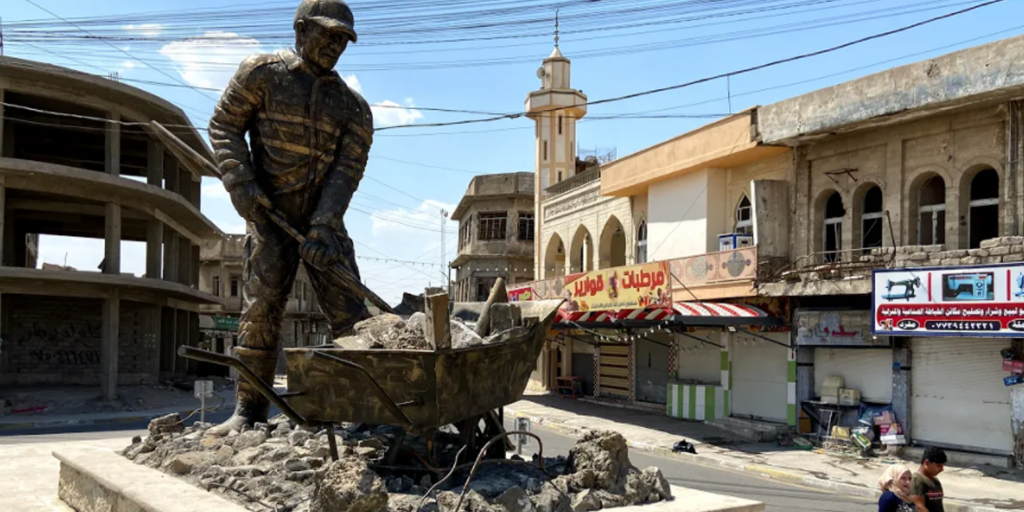
Iraqi officials have little patience for such conspiracies, or for allegations of collective punishment. The entire country suffers from corruption and terrible governance, they point out. The forces that liberated Mosul and suffered most of the casualties were predominantly Shia and Kurdish. And while ISIS recruits exclusively among Sunni Arabs, they also have killed a great number of Sunni Arabs. The Shia and Kurdish factions that dominate the Iraqi government say they cannot be expected to now favor Sunni Arabs with funds and services, after sacrificing so much to liberate Sunni areas from ISIS rule.
Both perspectives are understandable. Sunni revanchism and sectarian supremacism have fed movements like al-Qaeda and ISIS. Abuses in Sunni areas by Iraqi government forces, Shia militias, and the Kurdish peshmerga carry distinctly ethnic and sectarian overtones, and are functionally indistinguishable from collective punishment.
“ISIS is not finished. It’s an idea. It still has many supporters,” said Ahmed al-Jubore, a member of parliament and a retired general.13 He said that fifty-one of his immediate relatives were executed by ISIS, but that another thirty joined the jihadists. Some of them survive, in places unknown. Jubore and the governor both said in separate interviews that local corruption had hampered reconstruction efforts. Some Iraqi security forces behave professionally while others mistreat the population, he said, contributing to sectarian sentiment. Right now, ISIS is weak, Jubore said. But in the past, jihadist groups had successfully penetrated government security forces and built networks of support from a position of weakness; it could happen again.
Only a major investment in reconstruction, reconciliation, and better governance can break this cycle of jihadist insurgency and counterterrorist response. Because of Iraq’s financial crisis, corruption, and political considerations, such an initiative would have to be funded from abroad. The United States could showcase a pivot to constructive counterterrorism—building better governance in one-time terrorist havens—in and around Mosul. Addressing the grievances of the Islamic State’s erstwhile subjects, victims, and constituents won’t amount to a perfect insurance policy, but it’s a far better bet than the current U.S. templates: perpetual low-ebb war, or blitz-and-leave.
Still Not Too Late
The survivors, like twenty-year-old Bassam and his friends, spent their days hoping to pick up work at building sites, warehouses, or in the market. At night, they pooled their pocket money—on good nights, to share a few waterpipes of tobacco, and on nights like this one, when none had found work, to sip water from plastic bottles.
Mustafa al-Waad, twenty-five, was the leader of the group I met in the park; he was the oldest and had made it farther than the others in his education, dropping out in his final year of high school. Before ISIS came to power, Waad explained, there were more than thirty kids from the neighborhood who hung out together. Today, fewer than a third remain. “Those who are missing either joined the Islamic State or were killed by the Islamic State,” Waad said.
They did have one hero: a childhood friend who Waad said had joined ISIS but was really working as an informant for the Iraqi government. The other men joined in a chorus of details and praise. They said the man’s name was Hammoudi Haj. Even after ISIS was defeated in Mosul and fled underground, this infiltrator from the working-class district of Zanjili had stayed with the group, secretly feeding intelligence to the Iraqi security forces. In 2019, he was unmasked by ISIS and executed. ISIS sent threats by text message to Waad from his dead friend’s phone. His friends called the heroic informant “the lion of Mosul.” His grave was shattered by vandals days after his burial, and remains in pieces.
I wasn’t able to confirm the story about Hammoudi, but there are other astonishing, well-documented stories of Iraqi undercover agents who infiltrated ISIS and lost their lives after thwarting multiple suicide attacks.14 For his surviving friends in Zanjili, the story offered an inspiring example of personal courage and integrity in the face of nearly ubiquitous villainy. In the eyes of Waad, Bassam, and their friends, while ISIS is by far the worst offender, none of Iraq’s officials, institutions, or militias have the people’s best interest at heart.
Some survivors do not see a huge moral difference between ISIS and other armed groups that have held sway in Mosul since 2003.
“I hope they never come back,” Waad said of ISIS. Their defeat was welcome, but life was still precarious. Waad and his friends believe that ISIS has informants in the Iraqi security forces—that’s how their friend, the infiltrator, was unmasked. And Mosul’s youth face harassment from the security forces that liberated them from ISIS. One of the men in the park, for instance, said he had to shut down his auto body shop because the Iraqi security forces in the area demanded protection money he couldn’t afford.
In short, Waad and his friends felt little triumph. They had sided against ISIS but did not feel superior to those on the other side, whose ranks included friends and relatives. So many had died. Already, they were beginning to recall the excessive violence of ISIS as one of many dangerous periods in their short lifetimes; they did not see a huge moral difference between ISIS and other armed groups that had held sway in their city since 2003, when they were toddlers and the United States invaded.
Right-Sizing Counterterrorism
Considering the case of ISIS and Mosul raises another vexing question: how to bridge the bedeviling gap in analytical approaches, between too much abstraction and too much anecdote? We often find ourselves trapped in this binary: oversimplified, reductive strategy, like the U.S. “Global War on Terror,” or else a confusing swell of anecdotes that might have the benefit of being true and specific, but don’t illuminate a clear course of action.
The vast American national security apparatus vacillates between too much detail and not enough. The War on Terror lacks specificity, eliding the nuances that distinguish people and movements. By contrast, among the experts and journalists who work close to the ground truth and often impose the sole reality check on American policy, there is often too much granularity: all the anecdotes add up to a narrative, but not strategic clarity.
On the twentieth anniversary of 9/11, plenty of advocates and experts have opined in bad faith. Some have argued that every aspect of the War on Terror was bogus, as if there were no threat at all from jihadist groups and no role for military action against groups like ISIS.15 In contrast, others believe that unending low-ebb war is a viable response to jihadist threats; they’re all in for more War on Terror.16 Some veterans of U.S. counterterrorism policy are doing the legwork to define a better version.17 As Mosul shows, a wise course is difficult to chart: it requires investing money and resources as well as dropping bombs and fighting urban battles.
The War on Terror cannot be a catch-all for all of American foreign policy. But the United States does need a counterterrorism approach, and it has a particular opportunity and obligation to commit resources to Iraq, a strategic partner whose contemporary terrorism problem is a direct consequence of the unwarranted and incompetently executed U.S. invasion and occupation of Iraq in 2003.
Restrainers and isolationists want to end the excesses of the Global War on Terror, but often fail to grapple with the real challenge that remains: if the United States and its partners stop indiscriminate bombing, they still have to deal with the threat posed by ISIS and its affiliates. And they still have to pursue common interests in partnership with other nations, whose agendas will never fully align.18
An easy first step is to right-size the problem. After the attacks of September 11, counterterrorism swelled to become the entirety of U.S. foreign policy: doctrine, strategy, and tactics all in service of fighting one type of militant group. Now, the United States is shifting to a worldview that focuses on great power competition.19 In this new phase, the United States ought to let go of its dangerous dream of a world without risks or dangers for Americans. Then it can replace the Global War on Terror with a sound counterterrorism strategy that takes its rightful place as one subsidiary area among many in the second tier of international policy and security concerns.
This report is part of “Transnational Trends in Citizenship: Authoritarianism and the Emerging Global Culture of Resistance,” a TCF project supported by the Carnegie Corporation of New York and the Open Society Foundations.
header photo: The Old City of Mosul as it appeared in summer 2021, four years after the defeat of the Islamic State, with most of the area still rubble. Source: Thanassis Cambanis.
Notes
- Jane Arraf, “More Civilians Than ISIS Fighters Are Believed Killed In Mosul Battle,” All Things Considered, NPR, December 19, 2017, https://www.npr.org/sections/parallels/2017/12/19/570483824/more-civilians-than-isis-fighters-are-believed-killed-in-mosul-battle.
- Bassam, last name withheld, interview with author, Mosul, Iraq, July 15, 2021.
- For key examples of the critique, see Tariq Ali, “The War on Terror: 20 Years of Bloodshed and Delusion” The Nation, September 7, 2021, https://www.thenation.com/article/world/9-11-war-terror/, and Stephen Wertheim, “The Legacy of 9/11,” Prospect Magazine, July 14, 2021, https://www.prospectmagazine.co.uk/world/the-legacy-of-9-11-us-foreign-policy-afghanistan-iraq. For examples of the pro-status quo approach, see Robert Kagan, “A Superpower, Like It or Not,” Foreign Affairs, March/April 2021, https://www.foreignaffairs.com/articles/united-states/2021-02-16/superpower-it-or-not; Isaac Chotiner, “David Petraeus on American Mistakes in Afghanistan,” New Yorker, August 20, 2021, https://www.newyorker.com/news/q-and-a/david-petraeus-on-american-mistakes-in-afghanistan; and John R. Allen, “Biden Must Reverse His Decision to Quit Afghanistan,” Defense One, August 13, 2021, https://www.defenseone.com/ideas/2021/08/john-allen-biden-must-reverse-his-decision-quit-afghanistan/184512/.
- “Averting an ISIS Resurgence in Iraq and Syria,” International Crisis Group, Report 207, October 11, 2019, https://www.crisisgroup.org/middle-east-north-africa/eastern-mediterranean/syria/207-averting-isis-resurgence-iraq-and-syria.
- Becca Wasser, et al., “The Air War Against the Islamic State: The Role of Airpower in Operation Inherent Resolve,” RAND Corporation, February 5, 2021, https://www.rand.org/pubs/research_reports/RRA388-1.html.
- James Verini, They Will Have to Die Now (New York: W. W. Norton, 2019).
- “Operations are led by our partners, state or nonstate, with enabling support from the United States or U.S.-led coalitions, and through U.S. authorities and partner agreements,” wrote two senior U.S. military officials. See Joseph L. Votel and Eero R. Keravuori, “The By-With-Through Operational Approach,” Joint Force Quarterly 89, April 12, 2018, https://ndupress.ndu.edu/Media/News/News-Article-View/Article/1491891/the-by-with-through-operational-approach/.
- The UN High Commissioner for Refugees (UNHCR) and the International Organization for Migration (IOM) have published tallies of displaced people in Iraq throughout the last decade. (See “Iraq Refugee Crisis,” UNHCR, https://www.unrefugees.org/emergencies/iraq/; and “Iraq Mission,” IOM, https://iraq.iom.int/.) There are not, however, official sources for numbers of dead and wounded. Journalists and independent researchers have assembled credible estimates for the civilian dead in Mosul, based on figures from city morgue and hospital officials, but could not always identify whether the dead were civilians or ISIS fighters, and whether they had been killed by ISIS, by coalition airstrikes, or some other way. On civilian casualties, see for instance, Susannah George et al., “Mosul Is a Graveyard: Final Is Battle Kills 9,000 Civilians,” Associated Press, December 20, 2017, https://apnews.com/article/middle-east-only-on-ap-islamic-state-group-bbea7094fb954838a2fdc11278d65460; Raya Jalabi, “Battle over Bodies Rages Quietly in Iraq’s Mosul Long after Islamic State Defeat,” Reuters, February 5, 2018, https://www.reuters.com/article/us-mideast-crisis-mosul-bodies-insight/battle-over-bodies-rages-quietly-in-iraqs-mosul-long-after-islamic-state-defeat-idUSKBN1FP129; Riyadh Lafta, Maha A. Al-Nuaimi, Gilbert Burnham, “Injury and Death during the ISIS Occupation of Mosul and Its Liberation: Results from a 40-Cluster Household Survey,” PLOS Medicine 15, no. 5 (2018): e1002567, https://doi.org/10.1371/journal.pmed.1002567; Samuel Oakford, “Counting the Dead in Mosul,” The Atlantic, April 5, 2018, https://www.theatlantic.com/international/archive/2018/04/counting-the-dead-in-mosul/556466/; Belkis Willie, “Iraq: Not a Homecoming,” Human Rights Watch, June 14, 2019, https://www.hrw.org/news/2019/06/14/iraq-not-homecoming; and “Behind the Tally, Names and Lives,” Washington Post, November 18, 2020, https://www.washingtonpost.com/graphics/2020/world/coalition-airstrikes-isis-civilian-death-toll/.
- See “2 U.S. Soldiers Killed in Iraq in Combat Operations,” Associated Press, August 13, 2017, https://www.nytimes.com/2017/08/13/world/middleeast/us-troops-killed-in-iraq-in-combat-operations.html. According to another report, U.S. embassy officials in Baghdad told reporters that 1,400 Iraqi forces were killed and 7,000 wounded in the Mosul battle. See Helene Cooper, “Revived after Mosul, Iraqi Forces Prepare to Battle ISIS in Tal Afar,” New York Times, August 18, 2017, https://www.nytimes.com/2017/08/18/world/middleeast/iraq-tal-afar-isis-battle.html.
- One veteran Sunni politician told me—contrary to all evidence—that Sunni Arabs comprise fifty percent of Iraq’s population but had been marginalized as part of a conspiracy. Most estimates put the Sunni Arab fraction at about a quarter of the total population. See for example “2020 Report on International Religious Freedom: Iraq,” U.S. Department of State, May 12, 2021, https://www.state.gov/wp-content/uploads/2021/05/240282-IRAQ-2020-INTERNATIONAL-RELIGIOUS-FREEDOM-REPORT.pdf.
- A warrant for the arrest of former Nineveh governorate governor Nawfal Hammadi Al-Sultan was issued in March 2019. See “Iraq Orders Arrest of Ex-governor after Deadly Ferry Sinking,” Reuters, March 27, 2019, https://www.reuters.com/article/us-iraq-ferry/iraq-orders-arrest-of-ex-governor-after-deadly-ferry-sinking-idUSKCN1R81AV; and Aisha Kehoe Down, “Iraq Issues Warrant for Mosul’s Provincial Governor over Corruption,” Organized Crime and Corruption Reporting Project, March 27, 2019, https://www.occrp.org/en/daily/9470-iraq-issues-warrant-for-mosul-s-provincial-governor-over-corruption. The current governor, Najm Al Jabbouri, was a general who took part in the liberation of Mosul. He was appointed governor in November 2019. See Charlie Faulkner, “Mosul Appoints New Governor amid Acrimony as Predecessor Refuses to Step Down,” December 20, 2019, https://www.thenationalnews.com/world/mena/mosul-appoints-new-governor-amid-acrimony-as-predecessor-refuses-to-step-down-1.953827.
- Gov. Najim al-Jubouri, interview with author, Mosul, Iraq, July 15, 2021.
- Ahmed al-Jubore, interview with author, Mosul, July 16, 2021.
- Margaret Coker, “The Iraqi Spy Who Infiltrated ISIS,” New York Times, August 12, 2018, https://www.nytimes.com/2018/08/12/world/middleeast/iraqi-spy-isis.html.
- Ali, “The War on Terror;” Robert Kagan, “Opinion: It Wasn’t Hubris That Drove America into Afghanistan. It Was Fear,” Washington Post, August 26, 2021, https://www.washingtonpost.com/opinions/2021/08/26/robert-kagan-afghanistan-americans-forget/.
- Chotiner, “David Petraeus on American Mistakes in Afghanistan.”
- Daniel Benjamin and Steven Simon, “Beyond Forever War: A Smarter Counterterrorism Approach Is Now within Reach,” Foreign Affairs, September 10, 2021, https://www.foreignaffairs.com/articles/afghanistan/2021-09-10/beyond-forever-war and Daniel Byman, “The Good Enough Doctrine: Learning to Live With Terrorism,” Foreign Affairs 100, no. 5 (2021): 32–43.
- Daniel Deudney and G. John Ikenberry, “Misplaced Restraint: The Quincy Coalition versus Liberal Internationalism,” Survival 63, no. 4 (2021): 7–32.
- Avatars of restraint, or progressive foreign policy, or both have spent much of their energy defending drawdowns of U.S. military force, with less attention given to detailed proposals for the form of alternative engagement that enumerate a strategy for committing nonmilitary resources abroad. For example, see Chris Murphy, “Why Biden’s Afghanistan Critics Are Dangerously Wrong,” Crooked, September 13, 2021, https://crooked.com/articles/biden-afghanistan-critics-wrong/.
